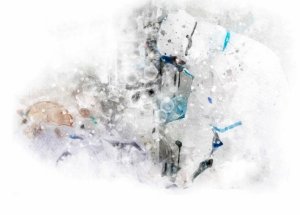
今天是2020年3月5日 星期四 第二十篇
天氣晴朗也很暖和。
封城至今已有三十多天。站在空寂的小區,依然能感受到春天潛滋暗長的氣息。一些樹木已經發芽,梅花依然開得茂盛。而一些人已經故去,再也看不到這年複一年的景致。
處於封閉中的人,對聲音非常敏感,熱衷於傾聽。此刻透過鳥鳴和細微的風聲,可以聽見有人在私語,爭辯,問詢。昨天上午有個婦女在陽臺上吼叫,引來一陣開啟窗戶的聲音。後來知道,這女的與自家女兒爭吵,鬱悶至極後到陽臺發泄。這種時候,我們最怕聽到哭聲。
不知不覺中,施虐的疫情開始平複。網絡上已經有人開始討論,這場災難後我們以及社會有什麼樣的改變。我覺得生活無時無刻不在改變,但他們所期待或認可的改變恐怕不會出現。如果說有所期待,我希望經過這場災變,我們可以對自己甚至對人類的面貌獲得一些真實的了解。我希望我們能夠對自己有所反省思辨,對以往既有的判斷更加謹慎,學會分析甄別。
三十多天來,我們看到了崇高也看到了種種無恥卑劣。那瞬間迸發的真情、勇敢、愛意令我們感佩,每一滴淚水都在洗滌沖刷我們的靈魂。而那些用巧言掩蓋的謊言、惡毒的行徑令我們作嘔蒙羞。那躲躲閃閃的冷漠、曖昧令我們倍感沮喪寒冷。
但這一切很快就會過去,我們將回歸到以往的生活。我們善於遺忘,我們不吝惜用最美好的文字編織苦難,目的也只是為了忘記。也許我們不希望也不需要改變。真的是這樣嗎,我不知道。在上帝面前我們永遠都是羔羊,總在迷失的路途中徘徊逡巡。
現在我只希望病毒在陽光下盡快消散,永遠遠離我們,永遠遠離所有善良的人們。
一整天,我們幾乎都在搬運東西。又收到了很多隔離服之類的物品,還是在十多天前我們尤其那些醫護人員是多麼地需要它們。
收到了政府下撥的蔬菜和一些米、油,我們負責將他們分裝,送給各小區困難的居民。
有人買到一些豆制品如幹子、千張,這讓他們一家人倍感幸福,孩子們個個吃的意猶未盡,興致高昂的同事不停地敘述著。
退休老人大多使用銀行存折,銀行沒有營業,他們取不到錢,而現在他們最需要錢。
我們幾個吸煙的人在一家雜貨鋪買到了一些香煙。雜貨鋪開了一小扇窗戶,老板把香煙遞出來,我們用手機微信掃一下,完成交易。這讓我想起計劃經濟時代郊外的農民偷偷到城裏賣米的情景,他們挑著擔子,悄聲詢問:要不要米,剛打下來的新米,不要糧票,很便宜的.......
THURSDAY, MAR. 5, 2020
The weather was sunny and warm.
It has been more than thirty days since the city was closed. Yet,
standing in an empty and silent area, I can still feel the latent breath of
spring. Some trees have sprouted, and plum blossoms are still in full
bloom. But some people have passed away. They can no longer see the
same scenery year after year.
People who live in isolation are very sensitive to sound and are eager
to listen. At the moment, through birdsong and the slightest sound of the
wind, we can hear people whispering, arguing, and asking questions.
Yesterday morning a woman yelled from the balcony, causing a flurry of
window openings. We later found out that the woman was arguing with
her daughter and was so depressed that she went to the balcony to vent
her frustration. At such times, we are most afraid of hearing crying.
Unknowingly, the devastating pandemic is beginning to recover.
There are already discussions on the internet about how we and society
have changed since the disaster. I feel that life is changing, but I am afraid
that the changes they are expecting or recognizing will not happen. If
anything, I hope to gain some real insight into ourselves and even into
the human mental condition after this disaster. I hope that we will reflect
on ourselves, be more cautious about our past judgments, and learn to
analyze and discern.
For more than 30 days, we have seen the nobility and the
shamelessness. We admire the bravery and true love that come from the
bottom of their hearts at the moment, and every tear washed and flushed
our souls. And those who use clever words to cover up the lies, evil deeds
make us vomit in disgrace. The dodging indifference and ambiguity make
us feel frustrated and cold.
But all this will soon pass, and we will return to our old lives. We
are good at forgetting the past. We don't hesitate to weave suffering with
the best words to forget. Maybe we don't want or need to change. Is that
the case? I don't know. In God's eyes, we are sheep, always wandering in
the lost land.
Now I just hope the virus will dissipate in the sunlight and stay away
from kind people forever.
All-day long, we at the community center were handing out goods.
We received many Medical Gowns and other items that we, especially the
medical staff needed more than ten days ago.
We received vegetables and some rice and oil from the government,
and we were responsible for distributing them to the residents in need in
each district.
Some people bought some soya products such as dried tofu, which
made the family feel happy. The children ate them all with great pleasure.
The colleague also seemed very excited when talking about this story.
Most of the retired seniors use bank passbooks. When banks are not
open, they cannot withdraw money, and now they need cash most.
A few of us smokers bought some cigarettes from a grocery store.
The store opened a small window, and the owner handed out the
cigarettes. We swiped them with WeChat pay on our cell phones to
complete the transaction. It reminded me of when farmers in the suburbs
sneaked into the city to sell rice during a planned economy. They were
carrying the rice packets in baskets and asked in a quiet voice: Do you
want rice, fresh rice, no need for food stamps, very cheap.



